Music Industry: Dominant Players, Revenue Generation Strategies & Impact of Globalisation, Mobilisation and Digitisation
VerifiedAdded on 2022/10/04
|6
|1565
|90
AI Summary
This essay elaborates on the dominant players pertaining to the music industry and the dominant strategies that helps in the generation of revenue within the boundaries of the music industry. The essay throws light on how music industry has been shaped by the forces of globalisation, mobilisation and digitisation.
Contribute Materials
Your contribution can guide someone’s learning journey. Share your
documents today.
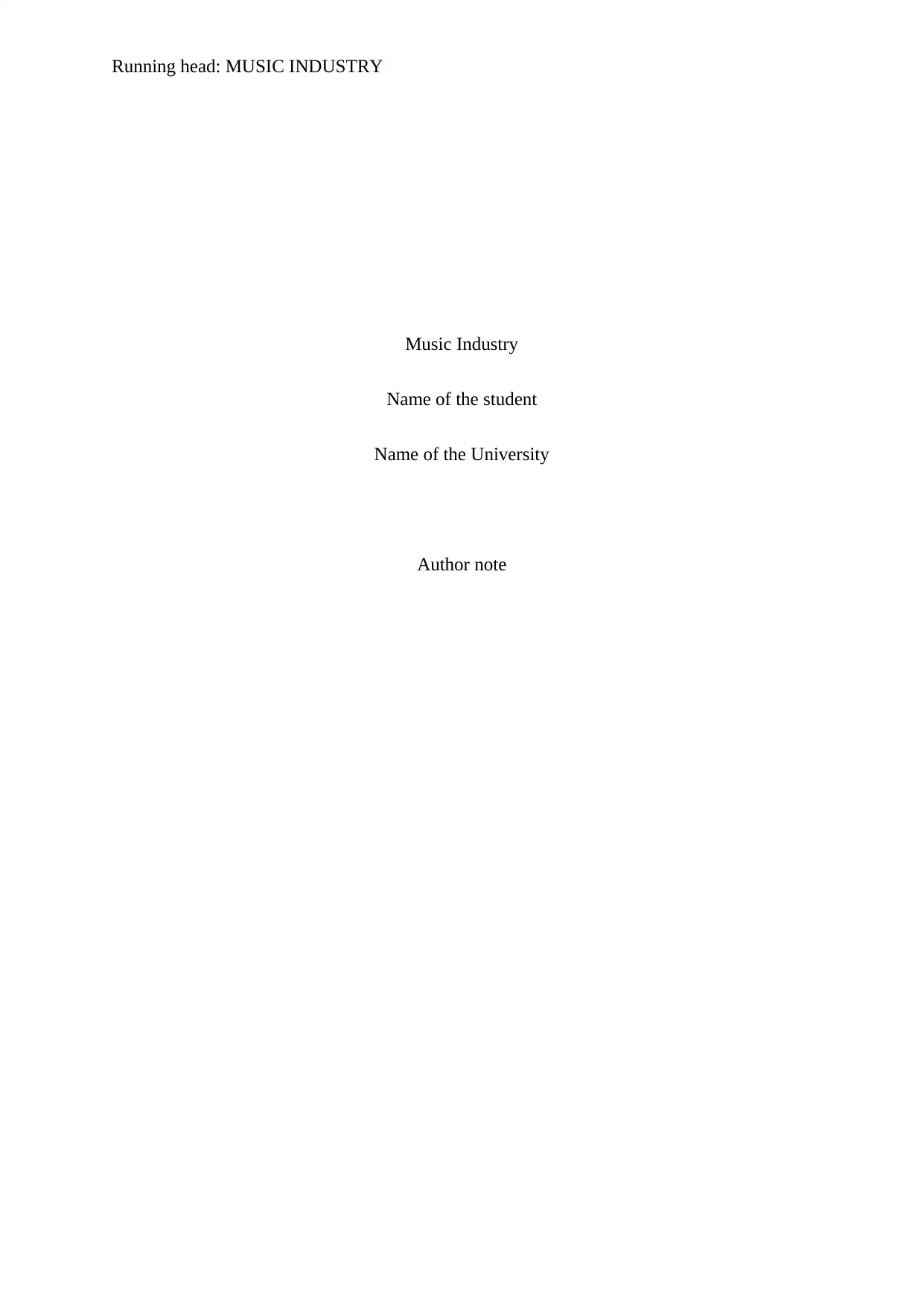
Running head: MUSIC INDUSTRY
Music Industry
Name of the student
Name of the University
Author note
Music Industry
Name of the student
Name of the University
Author note
Secure Best Marks with AI Grader
Need help grading? Try our AI Grader for instant feedback on your assignments.
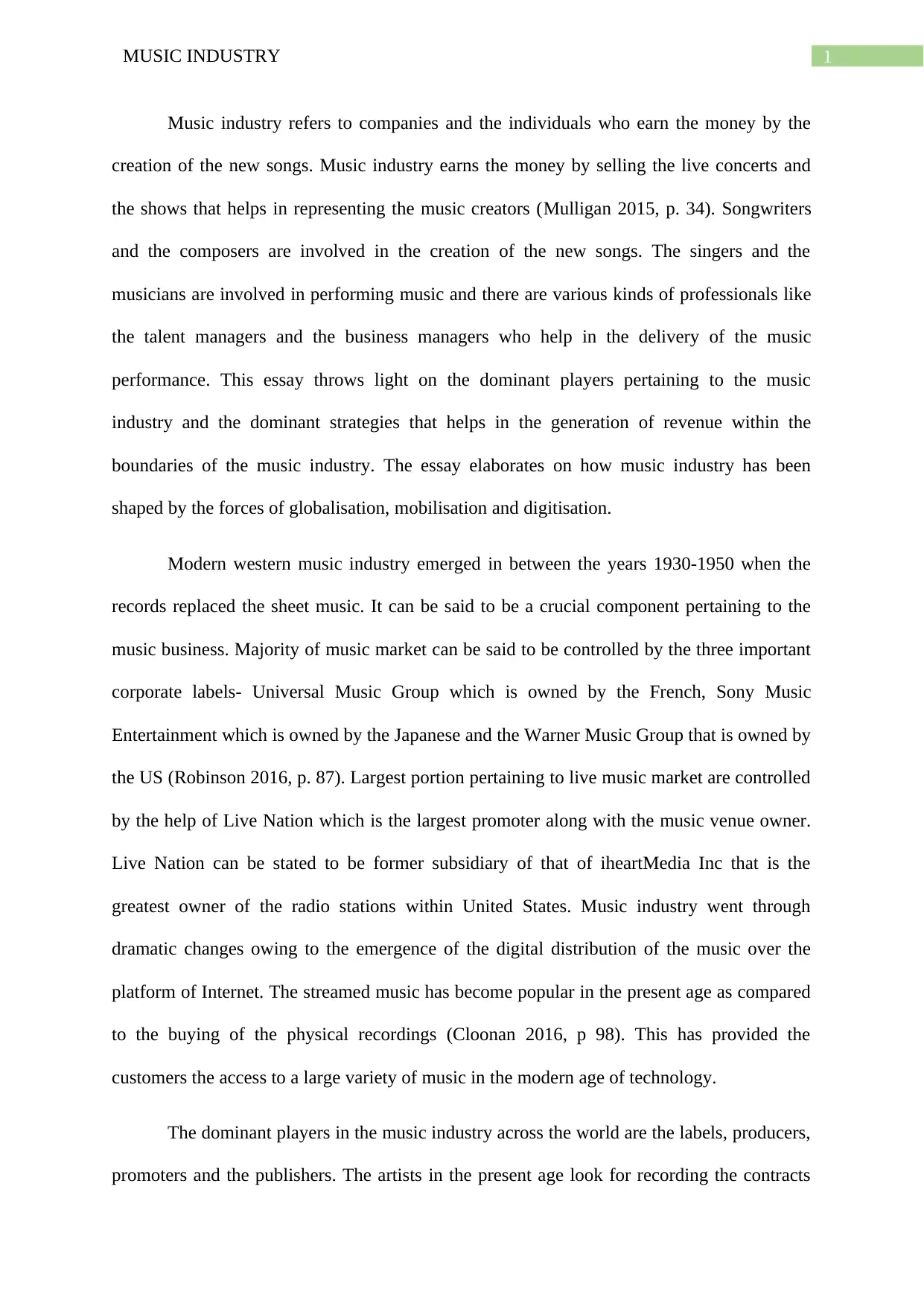
1MUSIC INDUSTRY
Music industry refers to companies and the individuals who earn the money by the
creation of the new songs. Music industry earns the money by selling the live concerts and
the shows that helps in representing the music creators (Mulligan 2015, p. 34). Songwriters
and the composers are involved in the creation of the new songs. The singers and the
musicians are involved in performing music and there are various kinds of professionals like
the talent managers and the business managers who help in the delivery of the music
performance. This essay throws light on the dominant players pertaining to the music
industry and the dominant strategies that helps in the generation of revenue within the
boundaries of the music industry. The essay elaborates on how music industry has been
shaped by the forces of globalisation, mobilisation and digitisation.
Modern western music industry emerged in between the years 1930-1950 when the
records replaced the sheet music. It can be said to be a crucial component pertaining to the
music business. Majority of music market can be said to be controlled by the three important
corporate labels- Universal Music Group which is owned by the French, Sony Music
Entertainment which is owned by the Japanese and the Warner Music Group that is owned by
the US (Robinson 2016, p. 87). Largest portion pertaining to live music market are controlled
by the help of Live Nation which is the largest promoter along with the music venue owner.
Live Nation can be stated to be former subsidiary of that of iheartMedia Inc that is the
greatest owner of the radio stations within United States. Music industry went through
dramatic changes owing to the emergence of the digital distribution of the music over the
platform of Internet. The streamed music has become popular in the present age as compared
to the buying of the physical recordings (Cloonan 2016, p 98). This has provided the
customers the access to a large variety of music in the modern age of technology.
The dominant players in the music industry across the world are the labels, producers,
promoters and the publishers. The artists in the present age look for recording the contracts
Music industry refers to companies and the individuals who earn the money by the
creation of the new songs. Music industry earns the money by selling the live concerts and
the shows that helps in representing the music creators (Mulligan 2015, p. 34). Songwriters
and the composers are involved in the creation of the new songs. The singers and the
musicians are involved in performing music and there are various kinds of professionals like
the talent managers and the business managers who help in the delivery of the music
performance. This essay throws light on the dominant players pertaining to the music
industry and the dominant strategies that helps in the generation of revenue within the
boundaries of the music industry. The essay elaborates on how music industry has been
shaped by the forces of globalisation, mobilisation and digitisation.
Modern western music industry emerged in between the years 1930-1950 when the
records replaced the sheet music. It can be said to be a crucial component pertaining to the
music business. Majority of music market can be said to be controlled by the three important
corporate labels- Universal Music Group which is owned by the French, Sony Music
Entertainment which is owned by the Japanese and the Warner Music Group that is owned by
the US (Robinson 2016, p. 87). Largest portion pertaining to live music market are controlled
by the help of Live Nation which is the largest promoter along with the music venue owner.
Live Nation can be stated to be former subsidiary of that of iheartMedia Inc that is the
greatest owner of the radio stations within United States. Music industry went through
dramatic changes owing to the emergence of the digital distribution of the music over the
platform of Internet. The streamed music has become popular in the present age as compared
to the buying of the physical recordings (Cloonan 2016, p 98). This has provided the
customers the access to a large variety of music in the modern age of technology.
The dominant players in the music industry across the world are the labels, producers,
promoters and the publishers. The artists in the present age look for recording the contracts
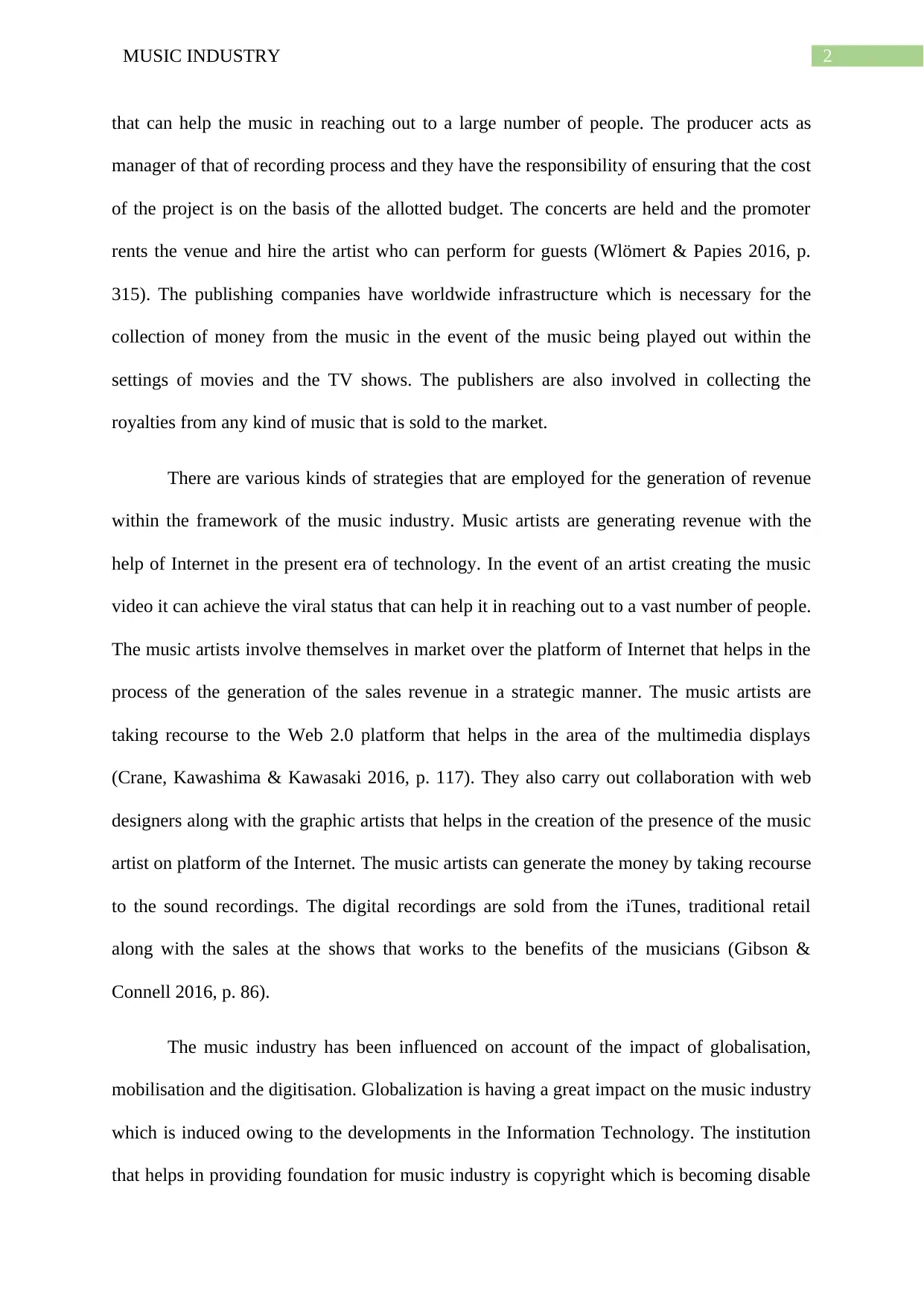
2MUSIC INDUSTRY
that can help the music in reaching out to a large number of people. The producer acts as
manager of that of recording process and they have the responsibility of ensuring that the cost
of the project is on the basis of the allotted budget. The concerts are held and the promoter
rents the venue and hire the artist who can perform for guests (Wlömert & Papies 2016, p.
315). The publishing companies have worldwide infrastructure which is necessary for the
collection of money from the music in the event of the music being played out within the
settings of movies and the TV shows. The publishers are also involved in collecting the
royalties from any kind of music that is sold to the market.
There are various kinds of strategies that are employed for the generation of revenue
within the framework of the music industry. Music artists are generating revenue with the
help of Internet in the present era of technology. In the event of an artist creating the music
video it can achieve the viral status that can help it in reaching out to a vast number of people.
The music artists involve themselves in market over the platform of Internet that helps in the
process of the generation of the sales revenue in a strategic manner. The music artists are
taking recourse to the Web 2.0 platform that helps in the area of the multimedia displays
(Crane, Kawashima & Kawasaki 2016, p. 117). They also carry out collaboration with web
designers along with the graphic artists that helps in the creation of the presence of the music
artist on platform of the Internet. The music artists can generate the money by taking recourse
to the sound recordings. The digital recordings are sold from the iTunes, traditional retail
along with the sales at the shows that works to the benefits of the musicians (Gibson &
Connell 2016, p. 86).
The music industry has been influenced on account of the impact of globalisation,
mobilisation and the digitisation. Globalization is having a great impact on the music industry
which is induced owing to the developments in the Information Technology. The institution
that helps in providing foundation for music industry is copyright which is becoming disable
that can help the music in reaching out to a large number of people. The producer acts as
manager of that of recording process and they have the responsibility of ensuring that the cost
of the project is on the basis of the allotted budget. The concerts are held and the promoter
rents the venue and hire the artist who can perform for guests (Wlömert & Papies 2016, p.
315). The publishing companies have worldwide infrastructure which is necessary for the
collection of money from the music in the event of the music being played out within the
settings of movies and the TV shows. The publishers are also involved in collecting the
royalties from any kind of music that is sold to the market.
There are various kinds of strategies that are employed for the generation of revenue
within the framework of the music industry. Music artists are generating revenue with the
help of Internet in the present era of technology. In the event of an artist creating the music
video it can achieve the viral status that can help it in reaching out to a vast number of people.
The music artists involve themselves in market over the platform of Internet that helps in the
process of the generation of the sales revenue in a strategic manner. The music artists are
taking recourse to the Web 2.0 platform that helps in the area of the multimedia displays
(Crane, Kawashima & Kawasaki 2016, p. 117). They also carry out collaboration with web
designers along with the graphic artists that helps in the creation of the presence of the music
artist on platform of the Internet. The music artists can generate the money by taking recourse
to the sound recordings. The digital recordings are sold from the iTunes, traditional retail
along with the sales at the shows that works to the benefits of the musicians (Gibson &
Connell 2016, p. 86).
The music industry has been influenced on account of the impact of globalisation,
mobilisation and the digitisation. Globalization is having a great impact on the music industry
which is induced owing to the developments in the Information Technology. The institution
that helps in providing foundation for music industry is copyright which is becoming disable
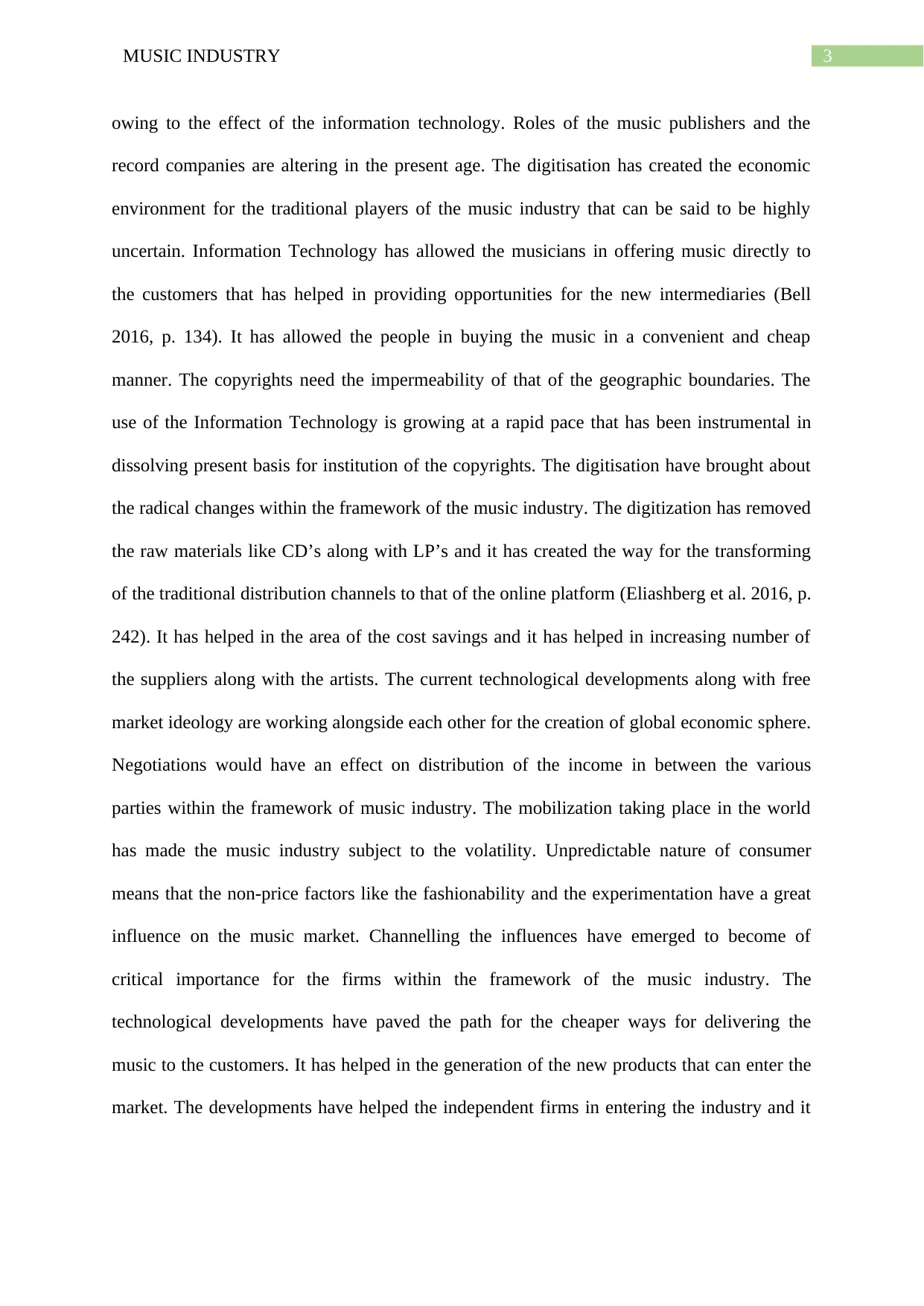
3MUSIC INDUSTRY
owing to the effect of the information technology. Roles of the music publishers and the
record companies are altering in the present age. The digitisation has created the economic
environment for the traditional players of the music industry that can be said to be highly
uncertain. Information Technology has allowed the musicians in offering music directly to
the customers that has helped in providing opportunities for the new intermediaries (Bell
2016, p. 134). It has allowed the people in buying the music in a convenient and cheap
manner. The copyrights need the impermeability of that of the geographic boundaries. The
use of the Information Technology is growing at a rapid pace that has been instrumental in
dissolving present basis for institution of the copyrights. The digitisation have brought about
the radical changes within the framework of the music industry. The digitization has removed
the raw materials like CD’s along with LP’s and it has created the way for the transforming
of the traditional distribution channels to that of the online platform (Eliashberg et al. 2016, p.
242). It has helped in the area of the cost savings and it has helped in increasing number of
the suppliers along with the artists. The current technological developments along with free
market ideology are working alongside each other for the creation of global economic sphere.
Negotiations would have an effect on distribution of the income in between the various
parties within the framework of music industry. The mobilization taking place in the world
has made the music industry subject to the volatility. Unpredictable nature of consumer
means that the non-price factors like the fashionability and the experimentation have a great
influence on the music market. Channelling the influences have emerged to become of
critical importance for the firms within the framework of the music industry. The
technological developments have paved the path for the cheaper ways for delivering the
music to the customers. It has helped in the generation of the new products that can enter the
market. The developments have helped the independent firms in entering the industry and it
owing to the effect of the information technology. Roles of the music publishers and the
record companies are altering in the present age. The digitisation has created the economic
environment for the traditional players of the music industry that can be said to be highly
uncertain. Information Technology has allowed the musicians in offering music directly to
the customers that has helped in providing opportunities for the new intermediaries (Bell
2016, p. 134). It has allowed the people in buying the music in a convenient and cheap
manner. The copyrights need the impermeability of that of the geographic boundaries. The
use of the Information Technology is growing at a rapid pace that has been instrumental in
dissolving present basis for institution of the copyrights. The digitisation have brought about
the radical changes within the framework of the music industry. The digitization has removed
the raw materials like CD’s along with LP’s and it has created the way for the transforming
of the traditional distribution channels to that of the online platform (Eliashberg et al. 2016, p.
242). It has helped in the area of the cost savings and it has helped in increasing number of
the suppliers along with the artists. The current technological developments along with free
market ideology are working alongside each other for the creation of global economic sphere.
Negotiations would have an effect on distribution of the income in between the various
parties within the framework of music industry. The mobilization taking place in the world
has made the music industry subject to the volatility. Unpredictable nature of consumer
means that the non-price factors like the fashionability and the experimentation have a great
influence on the music market. Channelling the influences have emerged to become of
critical importance for the firms within the framework of the music industry. The
technological developments have paved the path for the cheaper ways for delivering the
music to the customers. It has helped in the generation of the new products that can enter the
market. The developments have helped the independent firms in entering the industry and it
Secure Best Marks with AI Grader
Need help grading? Try our AI Grader for instant feedback on your assignments.
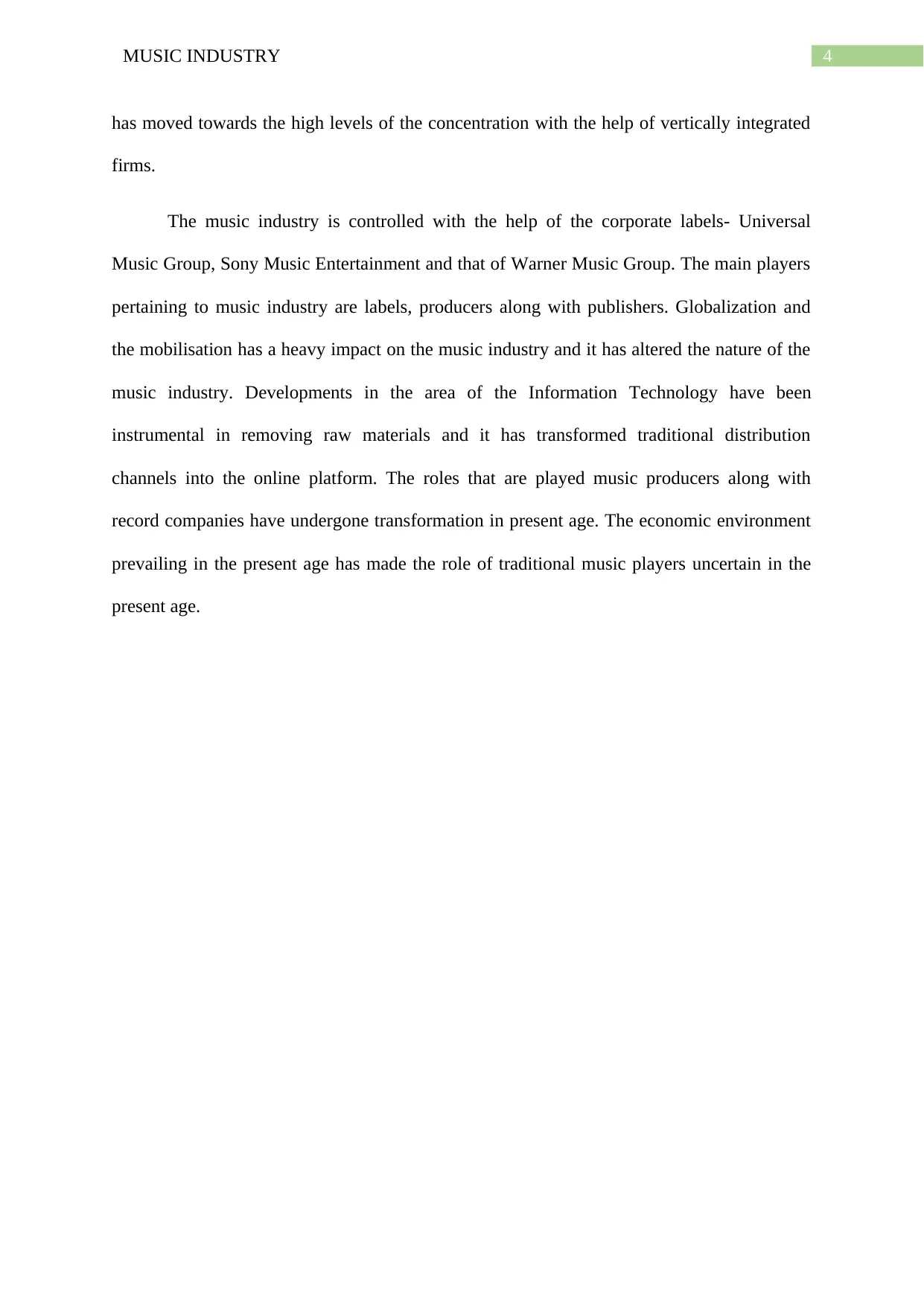
4MUSIC INDUSTRY
has moved towards the high levels of the concentration with the help of vertically integrated
firms.
The music industry is controlled with the help of the corporate labels- Universal
Music Group, Sony Music Entertainment and that of Warner Music Group. The main players
pertaining to music industry are labels, producers along with publishers. Globalization and
the mobilisation has a heavy impact on the music industry and it has altered the nature of the
music industry. Developments in the area of the Information Technology have been
instrumental in removing raw materials and it has transformed traditional distribution
channels into the online platform. The roles that are played music producers along with
record companies have undergone transformation in present age. The economic environment
prevailing in the present age has made the role of traditional music players uncertain in the
present age.
has moved towards the high levels of the concentration with the help of vertically integrated
firms.
The music industry is controlled with the help of the corporate labels- Universal
Music Group, Sony Music Entertainment and that of Warner Music Group. The main players
pertaining to music industry are labels, producers along with publishers. Globalization and
the mobilisation has a heavy impact on the music industry and it has altered the nature of the
music industry. Developments in the area of the Information Technology have been
instrumental in removing raw materials and it has transformed traditional distribution
channels into the online platform. The roles that are played music producers along with
record companies have undergone transformation in present age. The economic environment
prevailing in the present age has made the role of traditional music players uncertain in the
present age.
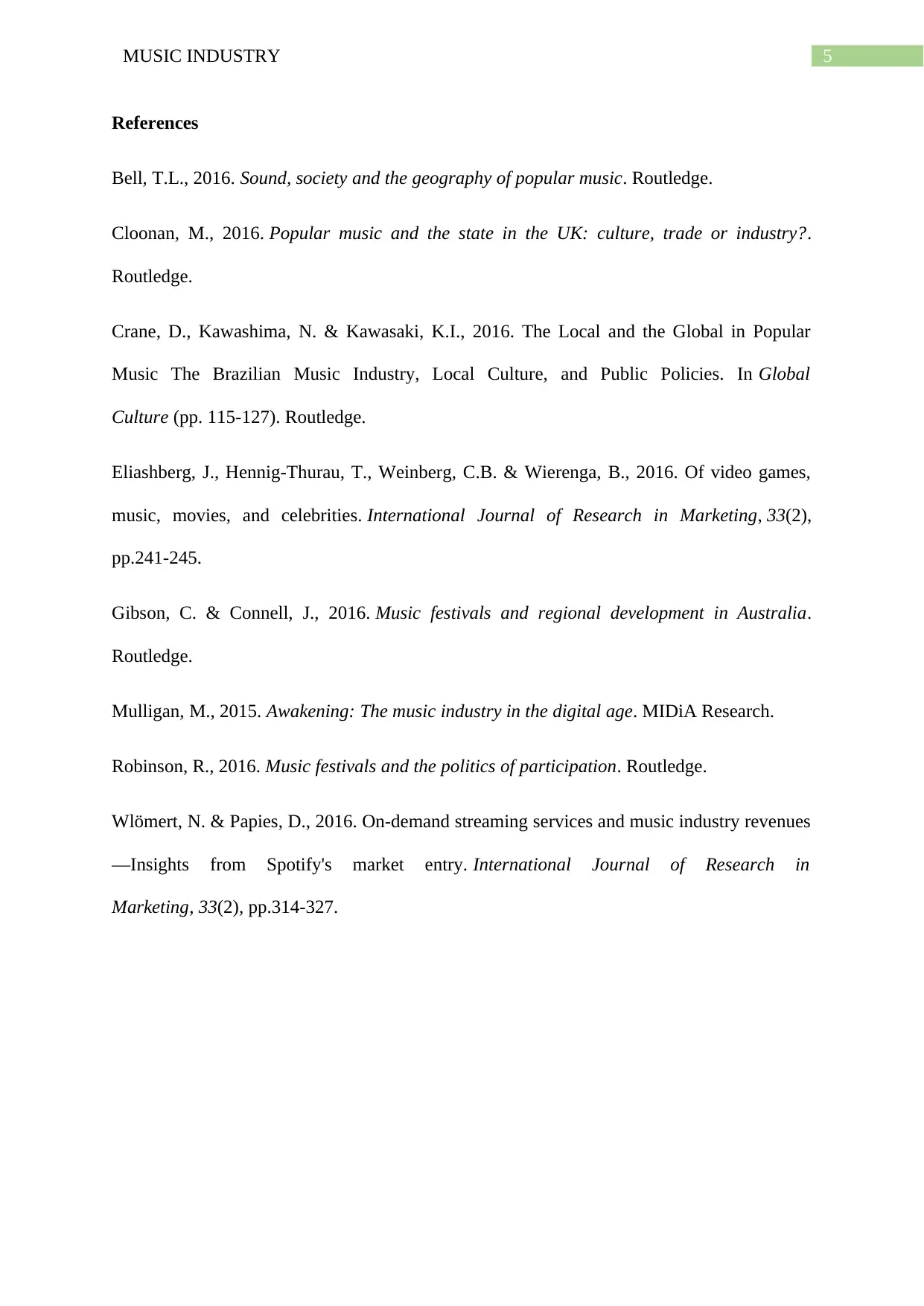
5MUSIC INDUSTRY
References
Bell, T.L., 2016. Sound, society and the geography of popular music. Routledge.
Cloonan, M., 2016. Popular music and the state in the UK: culture, trade or industry?.
Routledge.
Crane, D., Kawashima, N. & Kawasaki, K.I., 2016. The Local and the Global in Popular
Music The Brazilian Music Industry, Local Culture, and Public Policies. In Global
Culture (pp. 115-127). Routledge.
Eliashberg, J., Hennig-Thurau, T., Weinberg, C.B. & Wierenga, B., 2016. Of video games,
music, movies, and celebrities. International Journal of Research in Marketing, 33(2),
pp.241-245.
Gibson, C. & Connell, J., 2016. Music festivals and regional development in Australia.
Routledge.
Mulligan, M., 2015. Awakening: The music industry in the digital age. MIDiA Research.
Robinson, R., 2016. Music festivals and the politics of participation. Routledge.
Wlömert, N. & Papies, D., 2016. On-demand streaming services and music industry revenues
—Insights from Spotify's market entry. International Journal of Research in
Marketing, 33(2), pp.314-327.
References
Bell, T.L., 2016. Sound, society and the geography of popular music. Routledge.
Cloonan, M., 2016. Popular music and the state in the UK: culture, trade or industry?.
Routledge.
Crane, D., Kawashima, N. & Kawasaki, K.I., 2016. The Local and the Global in Popular
Music The Brazilian Music Industry, Local Culture, and Public Policies. In Global
Culture (pp. 115-127). Routledge.
Eliashberg, J., Hennig-Thurau, T., Weinberg, C.B. & Wierenga, B., 2016. Of video games,
music, movies, and celebrities. International Journal of Research in Marketing, 33(2),
pp.241-245.
Gibson, C. & Connell, J., 2016. Music festivals and regional development in Australia.
Routledge.
Mulligan, M., 2015. Awakening: The music industry in the digital age. MIDiA Research.
Robinson, R., 2016. Music festivals and the politics of participation. Routledge.
Wlömert, N. & Papies, D., 2016. On-demand streaming services and music industry revenues
—Insights from Spotify's market entry. International Journal of Research in
Marketing, 33(2), pp.314-327.
1 out of 6
Related Documents
Your All-in-One AI-Powered Toolkit for Academic Success.
+13062052269
info@desklib.com
Available 24*7 on WhatsApp / Email
![[object Object]](/_next/static/media/star-bottom.7253800d.svg)
Unlock your academic potential
© 2024 | Zucol Services PVT LTD | All rights reserved.



